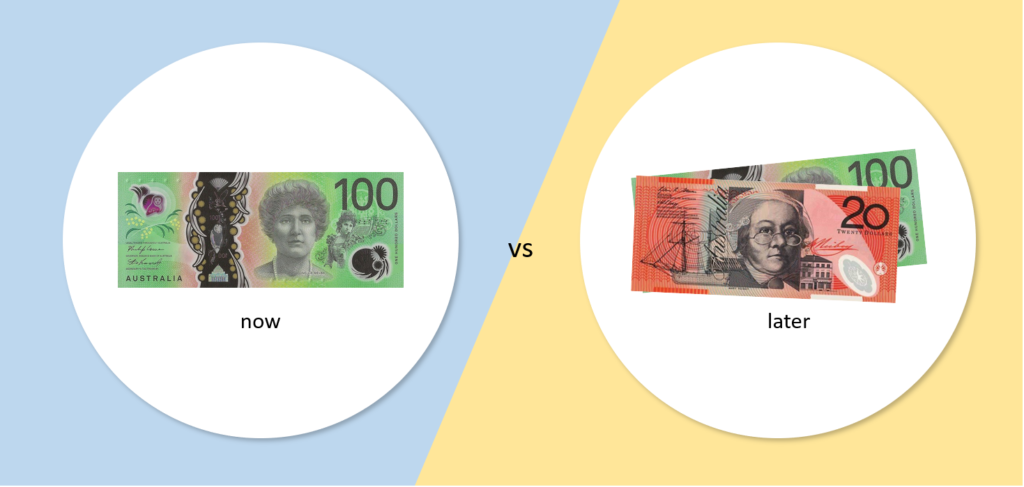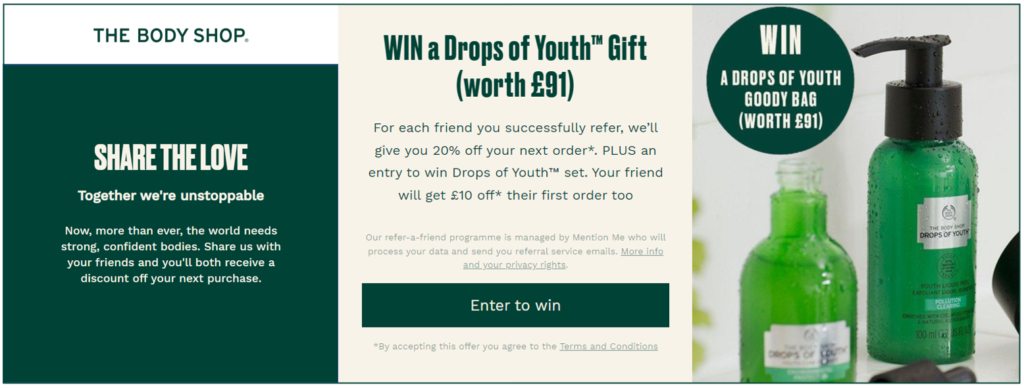
When making decisions, individuals do not necessarily consider all available information or act rationally. Mental shortcuts, known as heuristics, and cognitive biases are always at play. Knowing these behavioural biases can help in the design of better referral programs.
Referral programs are initiatives where existing customers are offered an incentive to introduce family and friends to become new customers of a company.
A quirk to consider, however, is that individuals value present rewards more than future rewards. This bias known as time discounting refers to the differences in the relative valuation placed on rewards at different points in time by comparing a reward’s valuation at an earlier date to a later date. [1]
For example, if offered to receive a $100 reward immediately over a $120 reward accessible in one month, most people would prefer $100 now. A reward that is available at a later date has less value than one that is available immediately.

The application of this behavioural bias in referral programs suggests to pay for referrals right away. Nevertheless, it is common for referral programs to delay rewards.
Usually, customers are offered an incentive to refer family and friends to purchase or sign up with a company. The referred friend is also offered an incentive and when he or she transacts with the company then both rewards become available. These incentives are normally credit or discounts.
The Body Shop referral program
The Body Shop referral program in the UK offers customers 20% off their next order for each successfully referred friend, who will receive £10 off their first order too. To make this program more appealing, The Body Shop has added an entry to win a gift valued at £91.

This is an easy to understand offer, it aims at enticing customers to promote the brand and incentivising potential new customers to place an order. However, if individuals are motivated by instant gratification, why would they want to wait for their contact to place an order?
Besides, their contact won’t redeem the offer immediately. Even when the reward is significant, the time to access the reward is delayed and unpredictable. The referee may even never redeem the offer.
Taking into consideration the time discounting bias, a more strategic approach would be to pay rewards immediately rather than on transactions.
PayPal referral program
This approach helped PayPal when the company started in early 2000. Within weeks the company had 100,000 customers and by March the same year, they hit the 1 million mark. [2]
The company offered people $20 if they opened an account and $20 if they referred anyone. Users just had to sign up, confirm their email address, and add a unique authorised credit card. The money was simply added to their account. Straight away people could use the money or transfer it to someone else.
Whilst it was an exuberantly expensive strategy, PayPal established a strong customer base and kick started the transactions and payment volume that would set them up for future success.

In this interview, Elon Musk explains “as the network got bigger and bigger, the value of the network itself exceeded any sort of carrot that we could offer.“
The focus was to generate from one customer two or three additional new customers. Rewarding immediately compelled people to do what PayPal needed them to do —tell the world about PayPal and start using the product straight away.
Challenge the thinking and the solution
Whilst The Body Shop referral structure allows program operators to manage costs and protect the company (they don’t have to give away anything if the offer is never redeemed), it may not be as successful. The purpose of a referral program is to bring in new customers, so low or no redemptions aren’t desirable. It is understandable why The Body Shop has included the chance to win an additional reward.
On the other hand, the PayPal approach is unsustainable and impossible to replicate in many other industries. The business structure lends itself to this type of program, but for other companies, the costs and the risks are high. People taking the reward and not referring would be worse than a program that generates low redemptions.
By reflecting on these two different examples where PayPal shows an extreme application of the time discounting bias, marketers, loyalty consultants, and program managers can challenge their thinking to improve referral programs.
For instance, referral programs within loyalty programs can offer instant bonus points or credits, or to move up in tiered programs. Companies with a subscription model can apply free monthly fees or upgrades immediately. Rental companies could offer free extensions when booking and adding a referral. Or retailers could offer customers to take free samples or gifts on the spot for referring friends whilst in-store.
There are many ways to leverage the time discounting bias. It is not about whether The Body Shop model or the PayPal approach is wrong or more suitable for a particular industry, but about finding ways to do better programs.
[1] Frederick, S., Loewenstein, G. & O’Donoghue, T., 2002, ‘Time discounting and time preference: A critical review’, Journal of Economic Literature, Vol 40, pp351-401.
[2] Brian O’Connell – History of PayPal: Timeline and Facts, updated Jan 2, 2020

